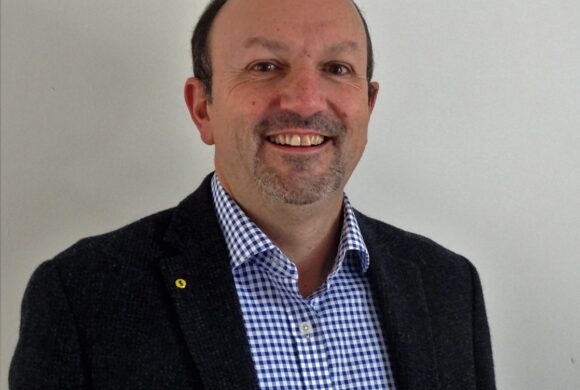
To mark Mental Health Awareness Week (18-24 May), we caught up with mental health expert and founder of 'Breaking the Silence', David Beeney. Listed in the top 101 influencers globally on employee engagement, we spoke about David's own challenges with mental health issues, how we can all protect ourselves during this pandemic, signs to look for to help others who may be struggling and the reasons why the profession of law seems to increase vulnerability for employees more so than other industries.
David, you are an advisor to business on how to reduce the stigma of mental health in the workplace, founding your company, Breaking the Silence, in 2016. Tell us about your background, why you set the company up and the work it does.
I had a reasonably successful career in media for over 36 years but was hiding my constant battles with panic attacks and anxiety from everybody in my life. However, my life changed forever in May 2016 when I outed myself and shared my mental health story for the first time. It resonated with so many people and at a deeper level than anything I had ever delivered before in my career. I kept being asked to share my story at conferences and seminars but realised within a few months that just telling my mental health story was not going to be enough. Many employees shared with me that they could not trust their employer and believed that if they were honest about their mental health it would have a negative impact on their career. I decided I needed to focus my energies on helping employers to create kinder cultures of trust where all employees could feel safe to be honest about their mental wellbeing. I also knew that every business who bought into this initiative would drive employee engagement and improve their business performance. With great excitement and a lot of purpose I founded Breaking the Silence in October 2016 and quickly became one of the leading advisors in the UK on ‘mental health in the workplace’. I am proud to have been listed in the top 101 influencers globally on employee engagement for the past two years.
What impact do you believe the coronavirus will have on mental health and how many of us will be impacted?
Everybody has mental health in the same way we all have physical health and everybody will be impacted in some way during this pandemic. We have this perception that we only have poor mental health if we are diagnosed with depression, anxiety, bipolar or schizophrenia, but that is simply not the case. Your mental health is simply the health of your mind and, if you have periods of low energy, days where you are struggling to concentrate, or are having disturbed sleep, that is poor mental health too.
You are a mental health expert for the Law Society and also help businesses across all industries build kinder workplaces. In your experience, are there risk factors particularly pertinent to law which increase vulnerability for employees more so than other industries?
At the risk of being a little controversial, the risk is greater in law firms than many other industries sectors. I believe that this is primarily down to two reasons. Firstly, too many lawyers still believe that admitting to poor mental health will be regarded as weakness by their employers and are yet to be convinced that you inspire others when you share vulnerability. Secondly, too many law firms are yet to address their culture with senior leaders still failing to create a kinder workplace where employees would feel safe to be honest about their wellbeing. I sadly hear far too often from lawyers that their employer is still ticking a box when it comes to mental health.
As a Mental Health Counsellor tell us how we should be protecting our mental health during this pandemic and period of lockdown?
It is very important to try and get sufficient sleep and to create time every day for some form of exercise. We must also not under-estimate the value of ‘me-time’ as the most important person to look after is yourself, particularly during times of crisis. We have all been on an aeroplane and advised that if the oxygen masks come down you must put yours on first, even if you have young children with you. As we know, we do this because, if you don’t, you may not be well enough to look after those around you. Well put quite simply, the more you love and protect yourself the more you are able to look after family, friends and work colleagues. It is not selfish to put your wellbeing first!
What advice would you give to us to stay emotionally connected with our teams?
The most important thing to do is give your employees the impression that your priority is their wellbeing as opposed to needs of the business. Every call should start with; “before we talk about work, how are you;” and then it is important to listen non judgementally. It is evidence-based that businesses that give priority to employee wellbeing during a crisis will benefit hugely when the crisis is over. Please also note that not every conversation needs to be about work. Caring, compassionate conversations drive employee engagement and productivity.
What signs should we be looking for that someone maybe struggling with their mental health?
We are looking for any noticeable change in behaviour whatsoever. Where we seem to struggle is how to then start a conversation without making either of us feel a little awkward. As a Mental Health Counsellor we are trained to notice not interpret. When we attempt to interpret we can easily become guilty of judging. So taking that onboard we are allowed to call out noticeable changes (as they are factual) and ask if people are okay. It is better to say something and get it a bit wrong, rather than say nothing at all!
Work is looking very different for us all right now. What should a ‘new’ typical day on lockdown look like?
Most of us will benefit from still having a structure to our working day. We should plan a start time and know what time we are going to close our laptop and finish work. You are far more likely to take breaks in your day too if you plan them into your diary just as you would a client meeting. This structure will support your wellbeing, plus it is evidenced based that a person taking a lunch break will be more productive in the afternoon than somebody who chooses to work through because they are too busy!
Our new ways of working look very different for everyone. What has been the biggest challenge for you personally adapting to the changes of remote working?
The biggest challenge for me has been how to make my talks and training as impactful now I am not physically in the same room as my attendees. I have a reputation for running around a conference hall or training room and creating lots of energy. The good news is that if you fully use the interactive tools in a virtual training environment and really plan your session to optimise engagement you can still create a very impactful and energised learning experience for all delegates.
What will be your biggest take away/lessons learned, personal or professional, from this very different world we find ourselves in now?
My biggest takeaway is that my key message to clients prior to this pandemic is now even more relevant than it was prior to Covid-19. That message being – businesses that create kinder cultures of trust will always drive employee engagement and improve the overall performance of their business.
Name 3 positives to have come out of lockdown.
- We will have seen the value of being kinder to both ourselves and others;
- More employers will offer flexible ways of working which in turn will benefit employee wellbeing;
- People managers will have become more skilled in how to drive employee engagement by seeing the value of having more ‘human moments’ with their team.


